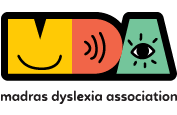
Dyscalculia – An Insight
Dyscalculia Services offered by MDA
By Revathi Sivasankar, Special Needs Educator for children with difficulty in mathematics
Dyscalculia (difficulty with calculation) is a Specific Learning Disorder (SLD) with impairment in Mathematics. It is associated with significant difficulty in understanding numbers and mathematical concepts. This disorder is rarely identified at an early age. A person with dyscalculia may consequently become frustrated and develop a dislike for numbers.
Sample this work done by dyscalculics to get an idea of the difficulty they face in understanding numbers:

One has to clearly understand that Specific Learning Disorders (SLD) are not intellectual impairment. People with SLD have significant difficulty in one or more areas while coping well or even excelling in other areas of academics, sporting or artistic achievements.
Specific Learning Disorders occur arbitrarily and are not caused by the school the child attends or the instruction that is provided. Evidence suggests that there may be an associated genetic component.
Predictions of potential Mathematical difficulties:
The affected individual:
• Is unable to ascertain which 2- digit number is larger and is unable to grasp the concept of Place Value. (Number facts).
• Is not able to add simple single digit numbers mentally.
• There are limitations with working memory capacity. Hence the person is slower in completing math tasks.
• Lacks effective counting strategies and continues to use fingers and other manipulatives.
It is interesting to note the variety of strategies the child comes up with:
• One of them found the fingers were not enough to count so stood up
• to use the toes to continue counting.
• Another child was continually tapping his pencil in the notebook. Turned out he was busy counting unaware of the noise he was making.
• Some place their hands under their desk so no one will notice they are using their fingers.
Advice for parents:
• Some children despite attending school regularly and getting adequate instructions are unable to reach the same level as their peers. Do not blame the child or the school.
• When the child begins to experience difficulty, identification and support is necessary.
• Targeted intervention involving remediation, accommodation, appropriate support and ongoing encouragement will help the child develop the skills to calculate effectively and efficiently.
• Get the child tested by the experts in the field. Sooner the testing, lesser will be the anxiety and stress for the child and the parents.
What are the tests and what is assessed?
• Testing sheds light on issues with working memory.
• Specific tests assess:
Computation skills.
Mathematical fluency.
Mental computation.
Quantitative reasoning.
Once the test results are assessed appropriate remedial measures are recommended.
Remedial Measures
Remediation, appropriate support and encouragement will help the child develop the skills necessary to cope with the curriculum. Since these children require extra time, schools help in giving extra time during the examinations.
Various boards also give concessions during the board examinations. Some concessions provided include:
• Extra time of one hour for a three-hour paper.
• Use of calculator.
• Using Clarke’s table.
• Appointing amanuensis or a scribe either to read the paper or write the paper as per the need of the student.
Increasing awareness, help available through special educators and the concessions available in schools and the boards of education have had a positive impact. We hope the day is not far when no child will face ridicule and frustration and all children will enjoy working with numbers!
(For more information/clarification you can get in touch with me at revathi.siv@gmail.com or 09840696658.)
